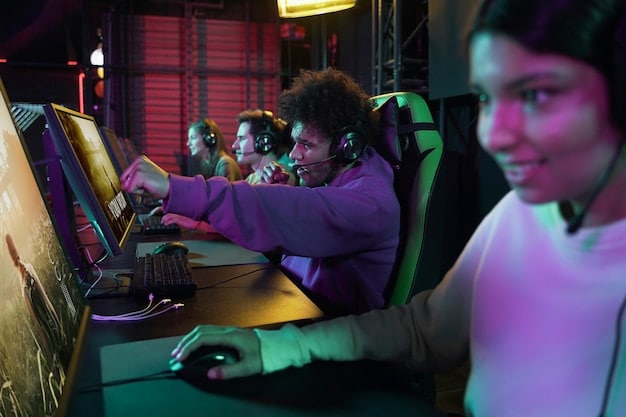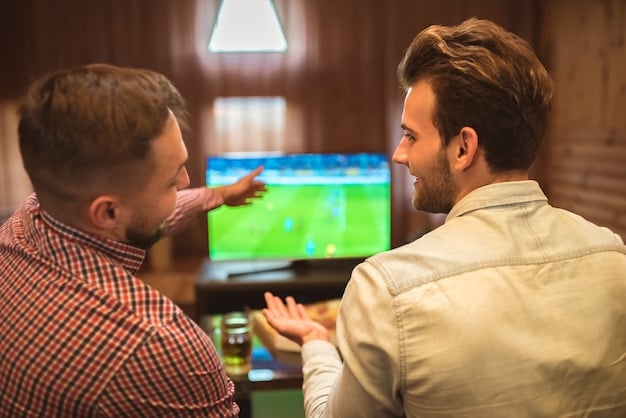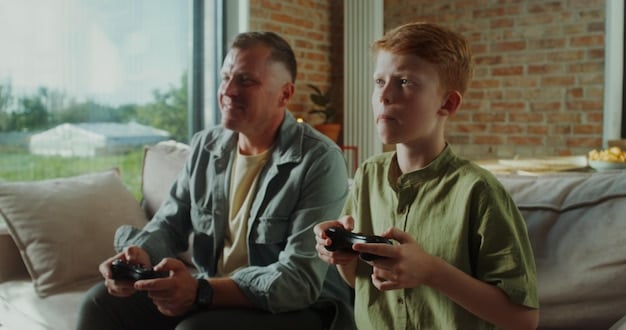Esports Coaching Strategies: Insights from Top US Coaches

Esports coaching strategies in the US involve personalized training, mental resilience building, data analytics integration, and effective communication, setting top coaches apart in competitive gaming.
The landscape of esports is rapidly evolving, and with it, the role of the coach. But what exactly are the esports coaching strategies that separate the best in the US from the rest? Let’s delve into it.
The Evolving Role of the Esports Coach
Esports coaching has matured significantly. Coaches are no longer just glorified cheerleaders. They are strategists, motivators, and analysts, all rolled into one. But how has this role evolved, and what demands does it place on coaches in the US?
From Manager to Mentor
The initial perception of an esports coach was akin to that of a team manager—someone who handled logistics and scheduling. Now, coaches are deeply involved in player development, both in terms of skills and mental fortitude.
Adaptability in a Dynamic Environment
The esports environment is incredibly fast-paced. New patches, metas, and strategies emerge constantly. Coaches need to be adaptable, continuously learning and adjusting their approaches.
- Strategic Acumen: Top coaches have a deep understanding of game mechanics.
- Analytical Skills: They can break down gameplay and identify areas for improvement.
- Communication Proficiency: Effective communication is vital for relaying strategies.
- Psychological Support: Esports can be mentally taxing; coaches help maintain resilience.
The modern esports coach is a multifaceted individual, required to wear many hats. Their ability to effectively navigate these roles directly influences team success.

Personalized Training Regimens
One size does not fit all in esports. Top US coaches are designing personalized training regimens tailored to individual player strengths and weaknesses. But how do they identify these needs and create effective training plans?
Identifying Individual Strengths
Before implementing any training program, a successful coach assesses each player’s unique strengths. This involves analyzing gameplay footage, reviewing performance metrics, and conducting one-on-one interviews.
Customized Practice Drills
Based on individual assessments, coaches create customized practice drills. These drills target specific areas where players need improvement, whether it’s mechanical skill, decision-making, or teamwork.
- Skill-Specific Training: Developing micro and macro skills specific to the game.
- Role-Based Exercises: Focusing on the demands and nuances of each role within the team.
- Adaptive Learning: Adjusting training based on player progress and feedback.
Personalization ensures that each training session is effective and relevant, maximizing player development and team cohesion.
The Mental Game: Building Resilience
Esports can be incredibly stressful. The ability to perform under pressure, cope with losses, and maintain focus is crucial. Leading US coaches are prioritizing mental resilience training. But what techniques are they using?
Stress Management Techniques
Coaches implement stress management techniques to help players maintain composure during high-stakes situations. These may include mindfulness exercises, breathing techniques, and progressive muscle relaxation.
Visualization and Positive Self-Talk
Visualization techniques, where players mentally rehearse successful plays, can improve confidence and performance. Positive self-talk helps counteract negative thoughts and maintain a positive mindset.

Mental fortitude is as vital as mechanical skill in esports. Coaches who invest in their players’ mental well-being are setting them up for long-term success.
Data Analytics: Leveraging Insights
Data analytics is revolutionizing esports. Coaches are using data to gain insights into player performance, opponent strategies, and game trends. But how are they collecting and interpreting this data?
Performance Tracking Metrics
Coaches track various performance metrics, such as accuracy, reaction time, and decision-making speed. This data provides objective insights into player strengths and weaknesses.
Opponent Analysis Tools
Analyzing opponents’ gameplay is crucial for developing effective strategies. Coaches use specialized tools to identify opponent tendencies, map preferences, and common mistakes.
- Real-Time Feedback: Using data during practice sessions to provide immediate feedback.
- Trend Identification: Spotting emerging game trends and adjusting strategies accordingly.
- Data-Driven Decision-Making: Making informed decisions about team composition and tactics.
Data analytics enables coaches to make informed decisions. This data-driven approach gives teams a competitive edge, improving their odds of success in tournaments.
Effective Communication Strategies
Clear and open communication is essential in any team environment. In esports, where split-second decisions matter, it’s doubly important. What strategies do top US coaches employ to foster effective communication?
Establishing Clear Roles and Responsibilities
Coaches define explicit roles and responsibilities for each player. This minimizes confusion and ensures that everyone knows what is expected of them during gameplay.
Encouraging Open Dialogue
Creating a culture of open dialogue, where players feel comfortable sharing their thoughts and concerns, is vital. Coaches set the tone, encouraging constructive feedback and active listening.
- Regular Meetings: Holding frequent team meetings to discuss strategy, review gameplay, and address issues.
- Constructive Criticism: Providing feedback that is specific, actionable, and focused on improvement.
- Non-Verbal Communication: Recognizing and interpreting non-verbal cues to better understand player dynamics.
Effective communication ensures everyone is on the same page. This enables teams to react quickly and decisively in the heat of the moment.
Fostering Team Cohesion and Culture
Beyond individual skill and strategic prowess, team cohesion—the ability of players to work together seamlessly—is critical. How do leading US coaches foster a positive team culture?
Building Trust and Respect
Coaches emphasize the importance of trust and respect among team members. This involves promoting empathy, honoring commitments, and fostering a supportive environment.
Organizing Team-Building Activities
Team-building activities, both inside and outside the game, can strengthen bonds and improve communication. These activities range from group dinners to collaborative problem-solving exercises.
- Shared Goals: Establishing clear, shared goals that everyone is committed to achieving.
- Conflict Resolution: Developing strategies for resolving conflicts constructively and respectfully.
- Celebrating Successes: Recognizing and celebrating achievements, whether big or small, to boost morale.
A positive team culture provides a solid foundation for success. Coaches who prioritize team building create an environment where players thrive and perform at their best.
In summary, the role of an esports coach extends far beyond teaching game mechanics. It’s a holistic approach encompasses personalized training, mental resilience, data analytics, and effective communication, ensuring optimal player development and team cohesion.
| Key Aspect | Brief Description |
|---|---|
| 🎯 Personalized Training | Tailored training regimens to improve individual strengths and address weaknesses. |
| 🧠 Mental Resilience | Techniques to manage stress, improve focus, and maintain composure during high-pressure situations. |
| 📊 Data Analytics | Leveraging data to gain insights into player performance, opponent strategies, and game trends. |
| 🗣️ Communication | Establishing clear roles and open dialogue to ensure effective teamwork. |
Frequently Asked Questions
▼
A good esports coach possesses strong strategic knowledge, excellent communication skills, and the ability to motivate and mentor players. They also need analytical skills to interpret data and adapt strategies accordingly.
▼
Esports coaches handle conflict by encouraging open communication, mediating disputes, and establishing clear rules of conduct. It’s crucial to address issues promptly and fairly to maintain team cohesion and morale.
▼
Data analysis provides insights into player performance, opponent strategies, and game trends. Coaches use data to make informed decisions, optimize training regimens, and gain a competitive edge in tournaments.
▼
Esports coaches build a positive team culture by fostering trust, respect, and open communication. Organizing team-building activities, setting shared goals, and celebrating successes also contribute to a positive environment.
▼
Common challenges include managing player expectations, dealing with high-pressure situations, adapting to rapidly changing game metas, and balancing individual development with team objectives. Maintaining player mental health is also crucial.
Conclusion
In conclusion, top esports coaches in the US are implementing comprehensive strategies that cover skill development, mental resilience, data analytics, and team cohesion. These multifaceted approaches are redefining the role of the coach and contributing to the overall success of esports teams.





